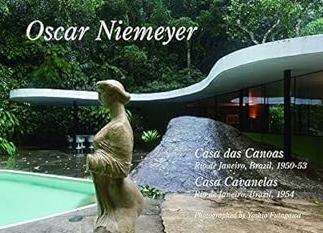Curves of Time: Oscar Niemeyer Memoirs

Some people live to work while others work to live, and based on this charmingly relaxed and meandering memoir, it would seem that Oscar Niemeyer definitely falls in the latter category. Not to say that he doesn’t spend considerable time here musing on his crowning achievement, Brasilia. It’s just that he does so the same way that he recounts everything else here, dispensing with details and strict linearity (much like in his built work), shifting casually between different points in time (including the very days he is working on what became this book), and focusing on the human relationships and friendships behind a project (such as with Lucia Costa, his mentor and the so-called “father of Brazilian modernism,” as well as Le Corbusier) than their technical, administrative, and budgetary minutiae.
Niemeyer designed the vast majority of the municipal buildings for Brasilia, the city built “overnight” in the 1960s out of the desolate interior of his native Brazil to serve as the country’s new capital, and the sensuously curvy modernism of its skyline has effectively become his stylistic signature, even if he didn’t anticipate the vast and ugly exurban sprawl that has since come to ring the city’s dazzling axial core.
So much more than a professional memoir, this is really the unhurried, and endearingly nostalgic, reminiscences of a passionate man motivated not so much by professional or financial gain (in fact, he claims, he worked for years on Brasilia at the base rate of an average civil servant) as by a profound, even melancholic, love for his beautiful and troubled country; the ongoing struggle for relief from political and economic oppression around the world; and, above all, a vast web of lifelong friendships. To wit, there are far more photos here of Niemeyer with his Brazilian cronies (many long dead, he laments openly) than there are of his projects (one reason why those not already somewhat familiar with his output may want to start elsewhere), and far more recounted about their prank-filled road trips between Rio and Brasilia than about the work that actually went on there. Those tales, and all of Niemeyer’s anecdotes and gentle, quirky musings here, possess a kind of melancholic glow, evocative of samba, wine, and the “uninhibited” women of his homeland.
He reminisces lyrically about Paris, Italy, and Algiers, where he lived and designed projects for much of the period during which Brazil was under a repressive dictatorship. But even amid his delight in world travel, his homesickness is apparent. “I want to watch the stars / I want to feel life / And be back in Brazil / That’s where I want to live,” goes a characteristically openhearted poem he wrote in those years of near-forced exile. It is the land and the people of his beloved Brazil, much more so than any or all of what he designed there or elsewhere, that make up the soul of this unconventional and thoroughly lovely memoir from one of the 20th century’s most talented, and passionate, architects. –Timothy Murphy
Out of stock
Out of stock




